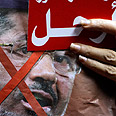
Arab Spring still here
Op-ed: Egyptian society's show of force proves that forecasts of 'Islamic winter' were detached from reality
The rivalry between the camps supporting and opposing the president is splitting the Egyptian society in an unprecedented manner, and attempts to bridge between the parties have not borne fruit. Army and police forces are deployed on a large scale, prepared for the possibility of violent clashes and even a scenario in which the army will be forced to intervene in running the country's affairs.
In a national address he gave last week, Morsi expressed his determination to take different measures in order to guarantee that he will remain in power, stressing to the army commanders that "the president is the supreme commander of the armed forces."
A year ago, the presidential elections were decided by the votes of citizens who do not belong to the religious parties' public of voters. In the victory speech he delivered at Tahrir Square, Morsi vowed to serve as president of all Egyptians and work to achieve the goals of the January revolution.
The steps he took were controversial and his policy failed to pull Egypt out of the serious crisis it is in. The economic situation and the internal security went from bad to worse. The markets are experiencing a shortage of products, mainly fuel and diesel oil. The standard of living indices, the inflation and unemployment rates have broken records. The local currency and the Cairo Stock Exchange indices have lost dozens of percentage points in value. The external aid, especially from Qatar, just slightly reduced the government deficit, which has climbed to a troubling rate of some 12% of gross national product.
Many in the opposition circles say that the president has failed to deal with internal problems because he is committed to the agenda of the Muslim Brotherhood, a movement he was one of the leaders of until recently. The Islamization of the country and society is the issue at the heart of the battle between the president's supporters and opponents.
Morsi's critics point to the president's faulty conduct during the preparation of the new constitution and the decrees he issued, granting himself unusual authorities. They further complain about the senior appointments he approved, which led to the takeover of key positions in the government systems by officials affiliated with the Islamist camp. Morsi's descriptions of his accomplishments were presented by his rivals as an expression of his complete detachment from reality in Egypt.
The opposition's sharp criticism was led by the National Salvation Front, a coalition of several parties led by prominent figures which is finding it difficult to come up with an accepted and effective action plan. This political partnership is based on firm opposition to President Morsi's rule and to the involvement of the Muslim Brotherhood movement in shaping the governmental order in Egypt.
The plans in the public arena were disrupted by a group of young people not affiliated with any party, which became active only two months ago. They launched a campaign under the banner "Rebellion," and managed to get more than 20 million signatures of citizens in favor of moving up the presidential elections. They also called for a protest at the entrance to the presidential palace on the anniversary of Morsi's election. In light of the huge support for the campaign, its organizers declared the establishment of the June 30 Front and presented a road map for running the state's affairs the day after the president is toppled.
3 scenarios
The Islamist camp sees that campaign and the protests against the president as an attempt to overthrow a democratically-elected government. The Statements made by President Morsi and the speakers of the Muslim Brotherhood and Salafists indicate that they plan to take all measures, including the use of force, to thwart the opposition's campaign.
This camp, which has the support of millions of citizens, understands that toppling the Morsi regime will deal a crushing blow to political Islam in Egypt. As far as they are concerned, there are much more significant interests at stake than the president's character.
The end of the protests and clashes between the rival camps in Egypt cannot be foreseen. Nonetheless, it is possible to point to several scenarios that could take place separately or combined:
One – the rival parties will reach a compromise which will leave President Morsi in power, replace the government and announce a date for parliamentary elections in the near future. Two – President Morsi and his regime will survive the wave of protests, but the clashes between the sides will grow worse and Egypt will find itself in a dead end. Three – the army will intervene and its leaders will take charge of the government and declare a transition period of several months, followed by general elections for all government institutions.
One important conclusion can definitely be drawn. The civil society forces which toppled President Mubarak's regime remain a critical factor in the battles over the shape of the new regime. The show of force presented these days by the civil society proves that the forecasts that the Arab Spring has turned in Egypt into an "Islamic winter" were simplistic and detached from the processes of social and political change taking place in the land of pyramids.
Prof. Yoram Meital is the chairman of the Chaim Herzog Center for Middle East Studies and Diplomacy at Ben-Gurion University










